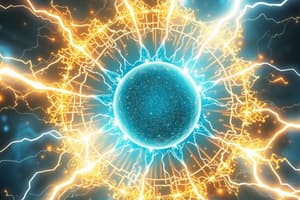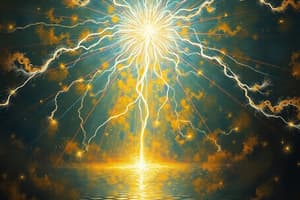Podcast
Questions and Answers
ما هي العناصر الأساسية المكونة لنواة الذرة؟
ما هي العناصر الأساسية المكونة لنواة الذرة؟
- البروتونات والنيوترونات (correct)
- الإلكترونات فقط
- البروتونات والإلكترونات
- النيوترونات والإلكترونات
الشحنات المتشابهة تتنافر.
الشحنات المتشابهة تتنافر.
True (A)
ما هو قانون كولوم؟
ما هو قانون كولوم؟
قانون كولوم هو قانون يحدد القوة الكهروستاتيكية بين جسمين مشحونين.
____________ هي المقاومة التي تواجهها حركة الإلكترونات في مادة ما.
____________ هي المقاومة التي تواجهها حركة الإلكترونات في مادة ما.
قوم بمطابقة المصطلحات مع تعريفاتها:
قوم بمطابقة المصطلحات مع تعريفاتها:
ما هو دور الإلكترونات في التوصيل الكهربائي؟
ما هو دور الإلكترونات في التوصيل الكهربائي؟
تعتمد الطاقة الكامنة الكهربائية لشحنة في مجال كهربائي على موقعها في هذا المجال.
تعتمد الطاقة الكامنة الكهربائية لشحنة في مجال كهربائي على موقعها في هذا المجال.
ما هي العلاقة بين الجهد والتيار والمقاومة؟
ما هي العلاقة بين الجهد والتيار والمقاومة؟
ما هي وظيفة المكثف في الدائرة الكهربائية؟
ما هي وظيفة المكثف في الدائرة الكهربائية؟
يحدث الحث الكهرومغناطيسي عندما يتغير المجال المغناطيسي ويكون موصلاً موجوداً في ذلك المجال.
يحدث الحث الكهرومغناطيسي عندما يتغير المجال المغناطيسي ويكون موصلاً موجوداً في ذلك المجال.
ما هو العنصر الأساسي لعملية الحث الكهرومغناطيسي؟
ما هو العنصر الأساسي لعملية الحث الكهرومغناطيسي؟
تُستخدم ______ في العديد من الدوائر لتصفية التيار وتنعيمه وتخزين الطاقة.
تُستخدم ______ في العديد من الدوائر لتصفية التيار وتنعيمه وتخزين الطاقة.
اطلب منك مطابقة التقنية مع التطبيق المناسب لها:
اطلب منك مطابقة التقنية مع التطبيق المناسب لها:
ما هي بعض التطبيقات العملية للحث الكهرومغناطيسي؟
ما هي بعض التطبيقات العملية للحث الكهرومغناطيسي؟
تُعد الكهرباء قوة دافعة للعديد من التقنيات التي تشكل عالمنا الحديث.
تُعد الكهرباء قوة دافعة للعديد من التقنيات التي تشكل عالمنا الحديث.
ما هي بعض المجالات المستقبلية التي ستشهد تقدماً في مجال الكهرباء؟
ما هي بعض المجالات المستقبلية التي ستشهد تقدماً في مجال الكهرباء؟
Flashcards
الكهرباء
الكهرباء
قوة أساسية للطبيعة، تتعلق بتدفق الإلكترونات.
الإلكترونات
الإلكترونات
جسيمات صغيرة تحمل شحنة سالبة وتدور حول النواة.
مستويات الطاقة
مستويات الطاقة
الإلكترونات تشغل مستويات محددة تؤثر على سلوك الذرة.
قانون كولوم
قانون كولوم
يصف القوة بين جسمين مشحونين.
Signup and view all the flashcards
الحقول الكهربائية
الحقول الكهربائية
توجد حول أي جسم مشحون وتؤثر على الشحنات الأخرى.
Signup and view all the flashcards
الجهد الكهربائي
الجهد الكهربائي
الفرق في الطاقة المحتملة بين نقطتين.
Signup and view all the flashcards
التيار الكهربائي
التيار الكهربائي
تدفق الشحنة الكهربائية، عادة الإلكترونات.
Signup and view all the flashcards
قانون أوم
قانون أوم
يصف العلاقة بين الجهد والتيار والمقاومة.
Signup and view all the flashcards
السعة
السعة
قياس قدرة المكثف على تخزين الشحنة الكهربائية.
Signup and view all the flashcards
المكثف
المكثف
جهاز يتكون من صفائح موصلة تفصل بينها مادة عازلة.
Signup and view all the flashcards
تخزين الشحنة
تخزين الشحنة
تجمع الشحنة الكهربائية على صحيفتي المكثف.
Signup and view all the flashcards
التحريض الكهرومغناطيسي
التحريض الكهرومغناطيسي
حدوث تيار كهربائي نتيجة تغيير الحقل المغناطيسي.
Signup and view all the flashcards
التيار المحرض
التيار المحرض
تيار كهربائي يتولد بواسطة حقل مغناطيسي متغير.
Signup and view all the flashcards
تطبيقات التحريض
تطبيقات التحريض
استخدام التحريض في المولدات والمحولات.
Signup and view all the flashcards
تطبيقات الكهرباء
تطبيقات الكهرباء
استخدام الكهرباء في التكنولوجيا الحديثة.
Signup and view all the flashcards
المستقبل في الكهرباء
المستقبل في الكهرباء
تطورات الكهرباء تشمل النانو والحوسبة الكمية والطاقة المتجددة.
Signup and view all the flashcardsStudy Notes
Electricity Fundamentals
- Electricity is a fundamental force of nature.
- It's the flow of electrons, tiny particles carrying a negative charge.
- This flow powers our world.
Atomic Structure and Electrons
- Atoms are the building blocks of matter.
- Electrons orbit a dense nucleus containing protons and neutrons.
- Electrons are responsible for chemical bonds and electrical conductivity.
- The arrangement of electrons in an atom determines its properties.
- Electrons occupy specific energy levels, impacting atomic behavior.
- Electrons exhibit wave-particle duality explained by quantum mechanics.
Electrical Charge and Coulomb's Law
- Electric charge is a fundamental property of matter, existing as positive or negative.
- Like charges repel each other.
- Opposite charges attract each other.
- Coulomb's Law quantifies the force between two charged objects.
Electric Fields and Potential Energy
- A charged object creates an electric field, exerting force on other charges.
- A charge within an electric field has potential energy.
- Work is done when a charge moves against the electric force.
- The difference in potential energy between two points is voltage.
Electric Current and Resistance
- Electric current is the flow of electric charge (typically electrons).
- Electric current (I) is the rate of charge flow.
- Resistance (R) is the opposition to current flow.
- Conductivity describes how easily electrons flow through a material.
Ohm's Law and Electrical Circuits
- Ohm's Law describes the relationship between current, voltage, and resistance in a circuit.
- Voltage is the driving force pushing current through a circuit.
- Current is the flow of electric charge through a circuit.
- Resistance opposes the flow of current in a circuit.
Capacitance and Capacitors
- Capacitance measures a capacitor's ability to store electric charge.
- Capacitors consist of two conductive plates separated by an insulator.
- Capacitors store electrical energy by accumulating charge on their plates.
- Capacitors are used in circuits for filtering, smoothing, and energy storage.
Electromagnetic Induction and Faraday's Law
- Electromagnetic induction occurs when a changing magnetic field induces an electric current in a conductor.
- A changing magnetic field is essential for induction.
- A conductor is necessary to carry the induced current.
- The changing magnetic field induces an electric current.
- Induction is used in generators, transformers, and other technologies.
Applications of Electricity in Technology
- Electricity is fundamental in many modern technologies.
- Computers and electronics rely on electricity for their operation.
- Electric cars and trains offer sustainable and efficient transportation.
- Renewable energy sources like wind and solar often rely on electricity production.
Conclusion and Future Developments
- Our understanding of electricity continues to evolve, leading to new discoveries and innovations.
- Nanotechnology explores the use of electricity at the nanoscale for advanced materials and devices.
- Quantum computing develops new computational models based on quantum mechanics.
- Improving renewable energy sources and their efficiency often involves electricity.
Studying That Suits You
Use AI to generate personalized quizzes and flashcards to suit your learning preferences.




